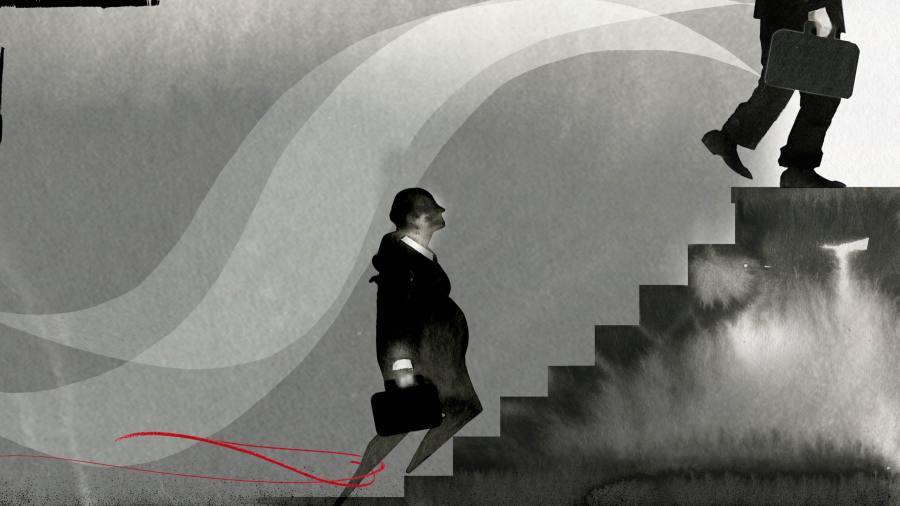Receive free Parenting and families updates
We’ll send you a myFT Daily Digest email rounding up the latest Parenting and families news every morning.
To be a parent is to be assaulted by the unexpected. How comfortable strangers feel petting your child. How many families in London sport the same brand of buggy. How quickly you become accustomed to gobbling (cold) meals in under a minute. How a small burp can soothe howls of rage. How on earth single parents manage. How long the sprog can go without a bowel movement. How fast they grow up. And when it comes to the economics of motherhood, the surprises don’t stop.
The first is how little others value parents’ time. No, I cannot attend a nursery event at 4.30pm on a weekday to mark International Play-Doh Day. Parenting is more work than it used to be, as the pressure to optimise one’s child through stimulating cultural activities has increased. Between 1965 and 2012, time spent on childcare by mothers rose in America, Britain, Germany and Denmark. Only in France did it fall. Alice Evans of the University of Toronto says that the French state has commandeered responsibility for creating perfect citizens, so women can get on with their lives.
Call me naive if you want. But I still find it mind-boggling how central children are to the earnings gap between men and women, at least in rich countries. In 2019 working-age women in Britain earned 40 per cent less than men, through a combination of lower hourly wages, working fewer hours and being less likely to work at all. The tell is the timing — those inequalities explode after having children. In Denmark, where rich data makes a proper decomposition possible, by 2013 about 80 per cent of earnings inequality between men and women was brought on by the patter of tiny feet and not, say, differences in education levels. Over time, that share has increased dramatically.
It turns out that leaning in is harder when there’s a child strapped to you. A recent working paper looks at how earnings of highly educated men and women diverge up to the age of 45 in Sweden. It doesn’t seem that the women they are studying choose cuddlier subjects at university or occupations with particularly dim pay prospects. Rather, about 70 per cent of the gap is because of differences in the probability of getting promoted — with its accompanying pay bump — within the same company. Of the wage growth lost because of those missed promotions, two-fifths happens during the year of birth(s) and the year after.
The worrying news for younger women is that even before they have children, they are less likely to be promoted than similar men. The better news is that by the age of 40, the gap closes. (Though they don’t recover that earlier missed wage growth.) Perhaps women are choosing to shy away from so-called “greedy jobs” in anticipation of wanting to care for a greedier baby. Mary Ann Bronson of Georgetown University, one of the study’s authors, suggests discrimination is also at play as employers withhold opportunities from young women they fear will go on maternity leave.
You might guess that parents are simply responding to market forces. Maybe fathers earn a bit more than their partners, perhaps because they are a bit older and further along in their career. With the eye-watering cost of nappies and nursery, not to mention finding the space for all the extra stuff, sacrificing the lower earner’s pay might be the only possible option. But a report by the Institute for Fiscal Studies finds that in Britain, even in heterosexual couples where the woman is the higher earner, their employment falls by 13 per cent after their first child, and stays there for a decade. For those who stay in employment, average working hours fall by more than a quarter. That does not look like financial optimisation.
At least there is an extraordinary range of ways to manage motherhood. A new database measures how children hit the employment of women relative to men, showing, for example, that in Portugal the hit is 16 per cent, while in neighbouring Spain it is an eye-popping 38 per cent. The optimistic interpretation is that we can choose, through norms and institutions, how to distribute childcare. Like a parent perusing squeezy purée pouches, we have options.
A final surprise is how people bifurcate between thinking that everything is down to preferences or constraints, rather than a murky interaction of the two. Teasing out the effects of peer pressure is extremely tricky — I couldn’t tell you exactly why I like my buggy so much. It’s certainly more fulfilling to push a happy toddler on a swing than it is to deal with a bad boss. Perhaps, though, that trade-off would be slightly different if young women were more likely to become the boss.
Read the full article here




